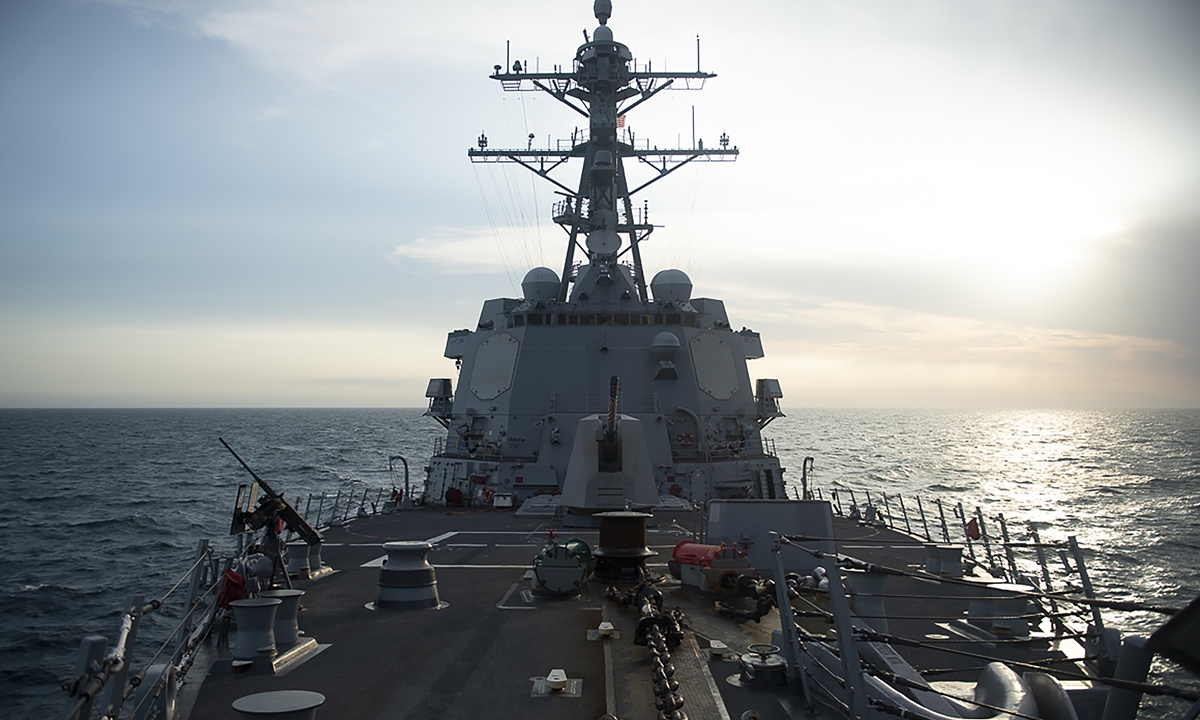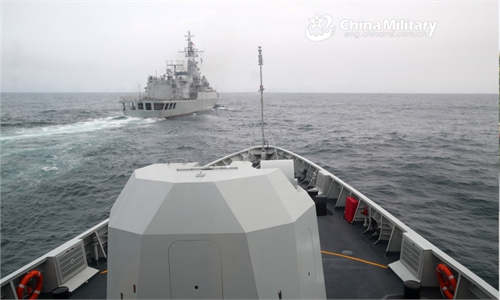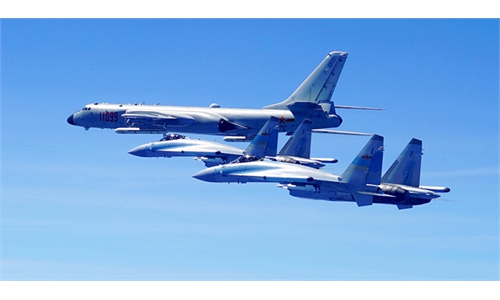No way for US to engage in ‘non-innocent passage’ through Taiwan Straits: Global Times editorial

The guided-missile destroyer USS Sampson sailed through the Taiwan Straits on April 26, 2022. Photo:VCG
After the Chinese Foreign Ministry emphasized the basic international legal fact that the Taiwan Straits are not "international waters," the US reacted fiercely, as if its tail had been trodden. For several days, it spoke out through various channels to distort China's position. A person familiar with the matter recently told Bloomberg that the US government has decided to reject China's "assertion."Why has the US used disguised replacement of concepts and continued to confuse the international community on this issue? Because the US fears it may lose its excuses for its provocative behaviors in the Taiwan Straits.
It should be reiterated that there are no such concepts as "international waters" or "international watercourses" in international law, but the phrases are used only as military terms in military publications like the US Commander's Handbook on the Law of Naval Operations.
If we go over the 1982 edition of the United Nations Convention on the Law of the Sea (UNCLOS), we would find there are no relevant rules and legal provisions on "international waters."
It is known to all that the US has never joined the UNCLOS, just to evade its obligations under international law and to dominate the oceans without any shackles.
Obviously, "international waters," "international waterways" as well as the "freedom of navigation" that the US has been talking about are the covers of its "navigational hegemony." China's explicit assertion of its legitimate rights over the Taiwan Straits has pulled off the US' fig leaf, which has kept the US from playing dirty. No wonder the US has been irritated because of the embarrassment.
What China has raised is not a new proposal. The Taiwan Straits range in width from about 70 nautical miles at its narrowest and 220 nautical miles (407 kilometers) at its widest. According to the UNCLOS and Chinese laws, the waters of the Taiwan Straits, extending from both shores toward the middle of the straits, are internal waters, territorial sea, contiguous zone and the exclusive economic zone. China has sovereignty, sovereign rights and jurisdiction over the Taiwan Straits. These are the legitimate claims endowed by the UNCLOS to any countries with such straits.
What needs to be emphasized here is that the second half of the Chinese Foreign Ministry spokesperson's sentence was deliberately ignored by the US - the spokesperson says that China "respects the lawful rights of other countries in relevant waters." China has never claimed that ships of other countries should not sail through the Taiwan Straits. The point is the UNCLOS also stipulates that foreign ships and aircraft must respect the rights of coastal countries in their exclusive economic zones, and military intelligence-gathering activities cannot be carried out. When getting close to a country's territorial waters from the high seas, it is even not allowed to broadcast without prior permission. They should show basic respect for the sovereignty of other countries when passing through.
In recent years, with Washington playing the "Taiwan card" more frequently, the frequency of US warships passing through the Taiwan Straits has significantly increased. According to statistics, US warships have transited the Taiwan Straits about once a month since 2020. Everyone knows what these warships are for. It could be said the purpose of their transits is to flex their muscles against the Chinese mainland and encourage the Taiwan secessionists. Conceivably, with such a goal, the appearance of those warships in the Taiwan Straits will inevitably aggravate tensions and endanger the peace and stability across the Taiwan Straits as well as China's national security. This is the non-innocent passage that China firmly opposes.
Some foreign media outlets said China's claims over the Taiwan Straits are inconsistent or even contradictory. This is not in line with the facts. China's position has never changed. According to the provisions of "Straits used for International Navigation" of Part III from the UNCLOS, "the regime of passage through straits used for international navigation shall not in other respects affect the legal status of the waters forming such straits or the exercise by the states bordering the straits of their sovereignty or jurisdiction over such waters and their air space, bed and subsoil." For example, the Malacca Strait is used for international navigation, and the waters in which it is located are also the territorial waters under the sovereignty of the states bordering the strait.
China has "sovereignty, sovereign rights and jurisdiction" over the Taiwan Straits, which is reasonable and completely follows the principle of legality and regulatory compliance. So it is impossible for China to compromise just because the Americans are not pleased. As the Chinese saying goes, when a friend comes, there is good wine, and when a jackal comes, there is a shotgun to greet it. Here is our advice to those foreign warships which want to make provocations in the Taiwan Straits: Look out!



